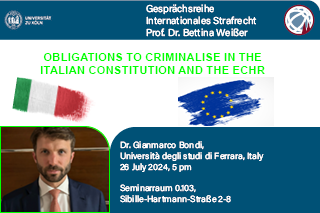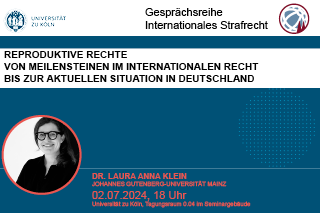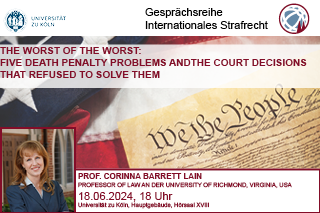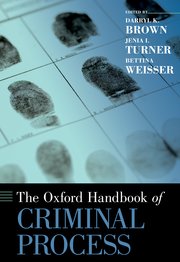Der Vorstand der Gesellschaft für Rechtsvergleichung kündigt die 39. Tagung für Rechtsvergleichung vom 12. bis 14. September 2024 in Berlin zu dem Thema
„Globaler Süden – globaler Norden“ an.
Detaillierte Informationen enthält das Tagungsprogramm. Eine Programmübersicht bietet das Plakat zur Tagung. Die Anmeldung finden Sie hier.
Ab sofort können die Klausuren Strafrecht II und Strafrecht III aus dem Sommersemester 2024 zu den Öffnungszeiten am Institut abgeholt werden.
Die Schwerpunktklausuren Europäisches Strafrecht (Dr. Duesberg), Cyberstrafrecht (Prof. Dr. M. Gercke) und Vertiefung Strafverfahrensrecht (Prof. Dr. Orth) können zu den Öffnungszeiten des Instituts eingesehen werden.
On the occasion of the 25th anniversary of the signing of the United Nations Convention against Transnational Organised Crime (UNTOC) and its Protocols, the Institute for Comparative Criminal Law had the great pleasure of welcoming experts and researchers from all over the world at Schloss Wahn to examine and vividly discuss the challenges and controversies of the UNTOC and its three Protocols.
Mark Shaw, Director of the Global Initiative against Transnational Organised Crime, started off the conference with his engaging keynote address. He addressed the main issues of the UNTOC: globalization, digital transformation and corruption of political leaders. Although the UNTOC can be viewed as a major political and legal achievement in the fight against organised crime, implementations of public and transparent review mechanisms are still missing.
In the first panel, chaired by Bettina Weisser, Francesco Calderoni (Università Cattolica del Sacro Cuore and Transcrime) outlined the evolution of the UNTOC and questioned the rather vague and broad definition of what constitutes organised crime. A practical insight into the application of the UNTOC was provided by Calogero Ferrara, European Delegated Prosecutor. Using the fight against organised crime in Italy as a blueprint, Ferrara applauded the incorporation of the „economic dimension“ (Falcone method) in the UNTOC and stressed the importance of international cooperation for using confiscation as a tool in combating organised crime groups.
The second panel, chaired by Andreas Schloenhardt, focused on the Protocol against Smuggling of Migrants as well as the Firearms Protocol. Frank Zimmermann (Albert-Ludwigs-Universität Freiburg) critically reflected on the interpretation, exceptions and limitations of the main regulations in the Protocol against Smuggling of Migrants and questioned the lack of liability of public officials in this context. Following up on this, the progress and prospects of the Protocol were analysed by Luigi Achilli (European University Institute, Florence). He compared the differences in theory and practice and, in view of the future, asked for a more proactive, cooperative approach for effective migration management and humanitarian success. Afterwards, Max Menn (UNODC, Firearms Trafficking Section) illustrated the evolution and experiences of the Firearms Protocol by pointing out the global dimension of firearms and the challenges imposed by technological developments.
The third panel was chaired by Joseph Lelliott (University of Queensland). First, Marika McAdam, Independent International Legal Consultant and Policy Adviser specialised in rights-based criminal justice responses to human trafficking and migrant smuggling, focused on the relationship between the UNTOC itself and the Trafficking in Persons Protocol. She drew attention to transnational organised trafficking networks which are – in contrast to “small traffickers” – not in the spotlight of the UNTOC’s national implementations. The second speaker, Parosha Chandran (King’s College, London, Human Rights Barrister at One Pump Court Chambers and Parliamentary Advisor) gave an inspiring overview of her work protecting victims of human trafficking from criminal punishment. With regard to her daily work, she particularly criticised the absence of an obligatory no-punishment-provision for victims in the UNTOC and emphasised the need for amendments.
To conclude, the fourth panel, chaired by Florian Jessberger (Humboldt-Universität zu Berlin) concentrated on the future of UNTOC. The first speaker, Julia Geneuss (Universität Bremen) pointed out obstacles and challenges which may arise from further crime types such as poly-crimes, digitalization and environmental crimes. In addition, Karine Bannelier (Université Grenoble Alpes) discussed recent negotiations about a UN convention against transnational organised cybercrime and assessed its possible scope, purpose and impact. Finally, Neil Boister (University of Canterbury, New Zealand) illustrated difficulties regarding international cooperation under the UNTOC, using the example of extradition. He emphasised the importance of reciprocity, communication, recognition of crimes, political legitimacy and trust for an effective cooperation between signatory states.
Many thanks to our excellent speakers and guests for an inspiring conference!
Titel: Obligations to criminalise in the Italian Constitution and the ECHR
Datum: 26. Juli 2024, 17 Uhr
Ort: Seminarraum 0.103, Sibille-Hartmann-Straße 2-8, 50969 Köln
Poster
Titel: Reproduktive Rechte: Von Meilensteinen im internationalen Recht bis zur aktuellen Situation in Deutschland
Datum: 02.07.2024
Zeit: 18 Uhr
Ort: Universität zu Köln, Tagungsraum 0.04, Seminargebäude
Titel: The worst of the worst: five death penalty problems and the court decisions that refused to solve them
Datum: 18.06.2024
Zeit: 18:00 Uhr
Ort: Hörsaal XVIII im Hauptgebäude
Veranstaltungsplakat
Informationen zu den Schwerpunktseminaren im Wintersemester 2020/2021 und Sommersemester 2021 Wintersemester 2021/2022 und finden Sie auf den Seiten Studium & Lehre.
Edited by Darryl K. Brown, Jenia Iontcheva Turner, and Bettina Weisser
Hardcover
Published: 22 March 2019
1072 Pages
6-3/4 x 9-3/4 inches
ISBN: 9780190659837
Weitere Informationen finden Sie hier.
Bitte beachten Sie die Hinweise und Vorsichtsmaßnahmen des Rektorats und der Rechtswissenschaftlichen Fakultät zum Corona-Virus.
Unser Institut ist bis auf Weiteres für den Publikumsverkehr geschlossen. Die Mitarbeiterinnen und Mitarbeiter des Instituts für ausländisches und internationales Strafrecht sind per Mail erreichbar.
Vortrag: Prof. Dr. Katalin Ligeti, Universität Luxemburg zu „Digital Evidence“.
Termin: 9. Juni, 18.30 Uhr
Ort: Hauptgebäude, Hörsaal XVII a






